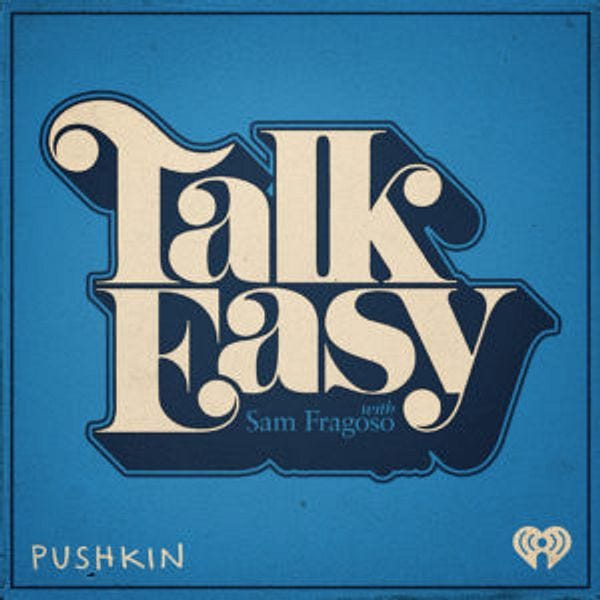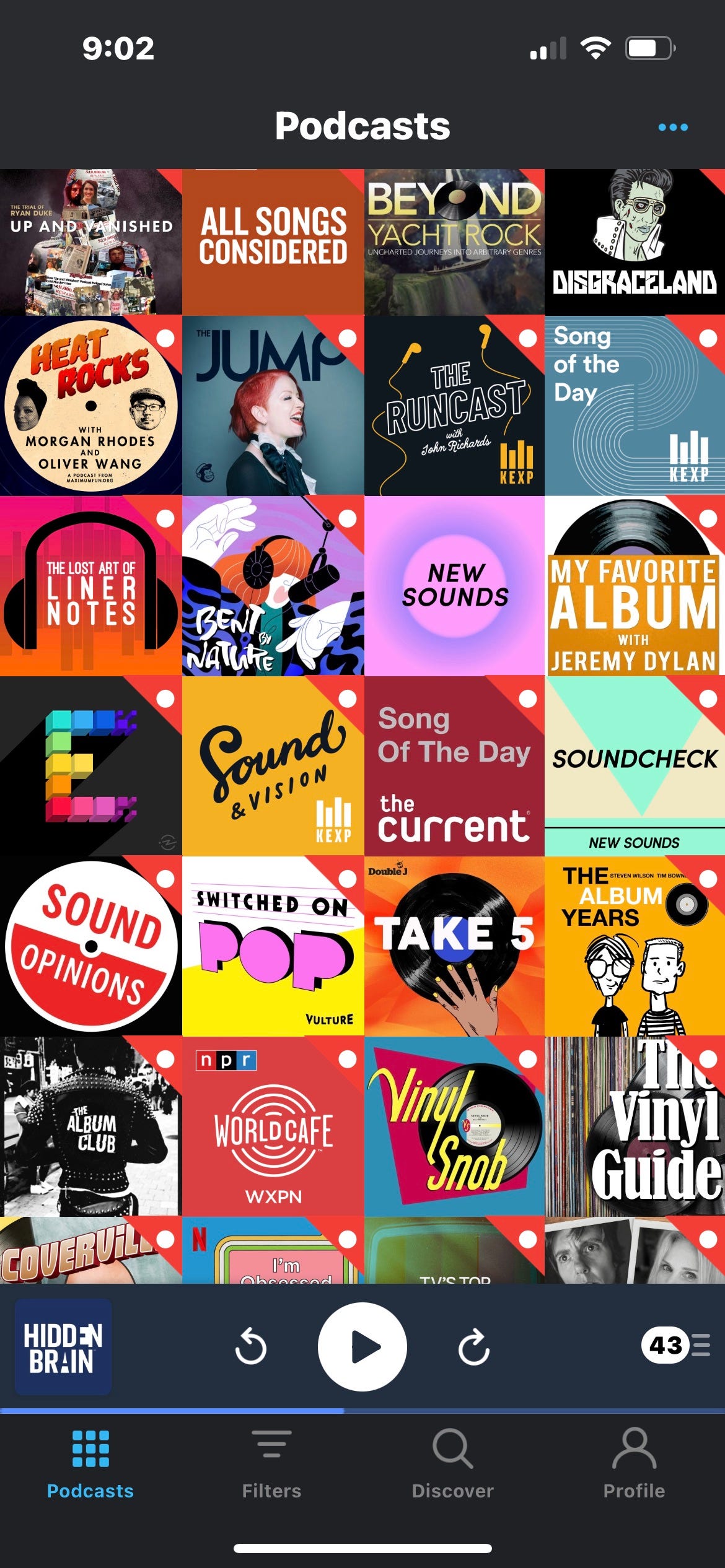Talk Easy with Sam Fragoso
The best interview podcast in the universe
Can a podcast be an earworm?
I think so, but not in the same way as a song. A spoken-word segment can certainly find lodging in the brain; hearing a poem might lead a person to recall and attempt to memorize a particularly vivid and affecting stanza, letting the words swirl around like ice cubes in a whiskey glass. But does the same thing happen when listening to two wise souls discuss their lives on a podcast?
I spend far more hours in a week listening to podcasts than I do music. I would suspect that this is the case for a large segment of the population today. My podcast app, Pocket Casts, has more than 120 saved podcasts. I’ve got them sorted into 8 separate genres. There’s the music themed (Sound Opinions, Take 5, Sound & Vision), literary themed (Grammar Girl, Write-Minded, Poem-A-Day), Investigative (This American Life, Snap Judgment), Interview based (Marc Maron WTF, On Being, Talk Easy) and other categories related to Spiritual Life, Film & TV, Comedy, and Science.
Have podcasts become the new music concert as well? It’s become quite common for popular podcasts to create and record their shows in front of a live audience. Disgraceland recently did a show in San Francisco that sold out within minutes. And there are even podcast festivals where people can pay 100 dollars (or more) to watch their favorite podcasters sit in front of a microphone and….talk? For one of my favorite podcasts, Sleep With Me: The Podcast That Puts You To Sleep, host Drew Ackerman will often record his show live with audience members arriving dressed in their pajamas, carrying blankets and eye pillows, ready to “watch” Drew tell dull stories in a room full of recliner chairs. Here’s a video of this. It happens in Alameda, CA quite regularly - anyone want to go with me?:)
But I’m getting off topic here.
The truth is I hadn’t finished my actual music-based earworm newsletter. It wasn’t coming together the way I wanted it to. Then I realized that what was more present for me the past couple days was a podcast I’ve been listening to nearly every day lately: the transcendent hour-long interview program, Talk Easy with Sam Fragoso.
If you haven’t heard the show (and I highly, highly recommend you do), TEwSF is like Fresh Air with Terry Gross, but imagine Terry as a precocious 20-something dude with a preternaturally perfect NPR slow-talk drawl, and an uncanny ability to connect to his guests, ask the perfect questions to deepen the conversations and somehow know just about everything his interview subject has ever written, performed, collaborated on and said.
It would be uncanny and impressive for someone twice Sam’s age to exude such refined, curious, open, confident and perceptive attention while interviewing such a diverse range of guests. But to do so at age 28, and with renowned guests from the political sphere, the film, literary and fine art scenes, as well as guests from the sciences and higher education arenas is borderline superhuman. Here’s a sampling of a few guests Sam has had on his show just in 2022. (Keep in mind, Sam started Talk Easy back in 2016, while still a senior in college at SF State.)
George Saunders, Questlove, Cate Blanchett, Stacy Abrams, Margaret Atwood, Marina Abramovic, Anita Hill, David Byrne, David Sedaris.
Every one of these talks is essential listening for anyone who is a fan of these artists, leaders and luminaries.
The episode I listened to earlier today, the one that led to me deciding that I had to write about this show, that I had to tell people about it, was an episode from May 8 with Minnie Driver.
Like so many other of his interviews, Sam starts this show off with the same question: How are you doing?
It’s such a throwaway inquiry, one we often ask each other upon meeting and usually answer with a generic “fine,” or “I’m good, how are you?” His guests might respond with a simple pleasantry, but without fail, they always stop to assess their true feelings, expanding their answer to include something genuine and heartfelt. It’s impressive how this question seems to relax the guest and drop whatever expectations and preconceived notions they might have brought with them to the interview. This isn’t going to be another ho-hum stop on the promotion train.
Minnie Driver, who recently released a collection of personal essays in a book titled, “Managing Expectations,” talks to Sam about her childhood, her relationship with her mother, being an actress in 90s Hollywood during Harvey Weinstein’s reign, becoming a mother, and working as an actress in her 50s. Topics one can imagine Terry Gross raising during an interview with Minnie. Yet Talk Easy lacks the overarching formality, the patina of NPR-coated distance that keeps Fresh Air from ever reaching the sublime.
Whoever Sam has as his guest each week, I always come away feeling, if not hopeful, then at least convinced that there are a lot of really smart, wise, open-minded people out there, creating art, and working to make positive change in the world and within themselves. We simply don’t get a chance to learn this in a sound bite/click-bait saturated media landscape.
Listening to Talk Easy with Sam Fragoso is the exact opposite of doom scrolling. (Well, except for the December 2021 episode with Noam Chomsky; that one was like a dagger in the heart of hope.)
During the heart of the pandemic in 2020 and 2021, Sam invited noted White House Coronavirus Response Coordinator Ashish Jha onto his show every couple of months to give detailed scientific information regarding vaccines, the specific differences between the myriad variants, the role of the CDC, and other topics related to the pandemic. I found it enormously helpful to listen to Ashish and Sam talk for more than an hour about the concerns I had regarding COVID, especially at a time when it seemed all the news and social media tended to lean toward fear, blame and misinformation.
In a recent episode with author Jennifer Egan, one of my favorite writers, I listened in amazement as Sam was able to pry Jennifer’s well-practiced (her words) defenses open, getting her to talk about her brother’s suicide and her own struggles with depression and anxiety. At one point Sam asks her about the divide between what she thinks and what she says — after she tells him that no person can know what another is thinking. She tells him that what she says is what she’s thinking. Really? Sam asks incredulously. And then she stops and corrects herself. Here are a few lines from what was said next, which come almost an hour into the show. (I recommend listening to this in the context of the entire interview).
Jennifer: Do you want to know what I’m thinking?
Sam: Yeah. I do.
Jennifer: I’m thinking that this interview is so intense and I had no idea what I was getting into when I walked into the studio.
Sam: Is that a bad thing?
Jennifer: No, I just hope that it’s not too revealing.
Jennifer goes on to tell Sam that with all the personal information she reveals, she has always been the one to curate and edit it, to package it how she wanted. But that for his show she has no idea how it might be edited and it makes her feel vulnerable. Sam tries to reassure her that he won’t edit her in any way that would misconstrue anything she’d said, and Jennifer finally admits that she trusts him, but it has brought to the surface a particularly sticky bit of insecurity.
How often do you get to hear your literary heroes express their vulnerabilities and fears honestly, in a way that makes you see their immense humanity, how they are just like me and you, warts and all. It felt alive and exciting to hear Jennifer Egan and Sam Fragoso, who’d never met before the recording, forming such a deep connection, live, as I was listening.
And that, in a nutshell, is what I love about Talk Easy. Sam has this way, no matter if his guest is a widely accomplished author like Jennifer Egan, actor Nick Offerman or gubernatorial candidate Stacey Abrams, of coaxing out — gently, compassionately — their genuine humanity and making you feel like you are an aural voyeur, listening in on an intimate conversation.
In a good way. In a deep way. In an easy way.




It feels to me reading this that what you elicit from podcasts is reflected in your own deep insight. Both you and Sam share that ability to listen to what is not said.
Hey thanks for the tip. I will try it today. Pocket Casts is my fave too. I’m originally from the south so I really appreciate its feature of incremental slowing down of the rapid-fire speak of most podcasts these days.